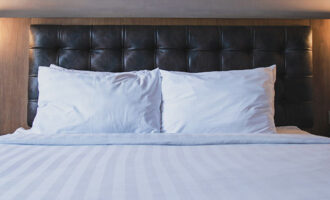Snoring might not seem like a big problem until you are sharing the same room or bed with someone. In fact, I am sure that most people don’t even know that they are snoring until they start living with someone. While it is a very natural thing, it becomes a problem when it is affecting the sleep of your partner and if they haven’t slept properly, chances are they aren’t going to be in a good mood. So, for the health of your partner and your relationship with the person you share a room with – even though you could get them some noise-cancelling headphones; let’s talk about some remedies that will help you stop snoring.
What Is Snoring And Why Does It Happen?
Snoring is usually caused when you can’t move air smoothly through your throat and nose while you are sleeping. This unstable flow caused the surrounding tissue to vibrate producing what is commonly known as the “snoring sound.” There are a lot of different reasons that cause snoring and once you identify why it is happening, addressing it will become so much easier.
Age
This is the most common cause of snoring because as you age, your throat muscles contract, and the passageway of your throat becomes much narrower. You can’t do anything about the workings of your throat or aging, but what you can do is make some lifestyle changes, change your bedtime routine, and do throat exercises.
Nasal or Sinus Problems
A stuffy nose or blocked airway can make breathing much more difficult, which can cause snoring.
Being overweight
Fatty tissue in your neck and throat can also cause snoring. Even if you aren’t overweight all over, carrying excess fat around the throat can still cause snoring.
Alcohol or medication
Alcohol and certain medications relax the throat muscles which is another cause of snoring.
Sleep posture
Sleeping positions also have an impact on snoring because sleeping on your back can cause the throat muscles to relax, which causes snoring.
What you should do
There are so many gimmicky devices available online that claim to help with snoring but they never end up working. But there is no need to worry because there are plenty of home remedies that have been effective in reducing snoring; hence you are sure to find one that works for you. The only thing is, the process of finding a technique that works for you requires a lot of experimentation so you have to be patient. With that, let’s get into discussing some home remedies that can help you.
- Change your sleeping position
Just like we discussed above, sleeping position can often cause snoring, and even though it may sound weird that just changing your sleeping position might relieve symptoms, it does make a difference. Sleeping on your back can cause your tongue to roll back into the throat which causes a blocked airflow, thus resulting in snoring. So, try sleeping on your side for a change and observe if that made a difference or not.
- Raise your head
Elevating your head a good few inches above your body can relieve snoring by keeping your airway clear and unblocked.
- Reduce Body Weight
Research has concluded that being overweight is one of the leading causes of snoring in adulthood and weight loss is considered one of the most effective treatments. This recommendation obviously extends to those who suffer from obesity. You can lose weight by bringing down your calorie intake and eating healthier foods. With controlled meals, make sure that you also get some sort of exercise regularly. And before you even think about losing weight, check if you have a healthy body weight and consult a doctor or a nutritionist to come up with a healthy weight loss program.
- Correct Nasal Structural Problems
Some people have nasal structural problems, either because of an injury or by birth. This structural defect can result in a deviated septum and misalignment of the nasal walls, which causes uneven airflow. This increases the likelihood of you breathing through your mouth, causing what we know to be snoring. The deviated septum can only be corrected through medical intervention which is why you should consult your doctor.
- Try Mouth Exercises
Aside from general exercise, consider trying out some mouth exercises, or better known as oropharyngeal exercises, because research has found that they are reasonably effective in reducing snoring. These mouth exercises often require you to do repeated movements of the tongue, mouth, and throat which strengthen the muscles in the mouth.
- Avoid Alcohol and Sedatives before Bed
As discussed previously, alcohol and certain medications cause the muscles in your throat to loosen, which can cause snoring. Not only is alcohol linked with snoring, but it can also cause sleep apnea in people who don’t even have apnea. Try reducing the amount you drink before bed and if that doesn’t work, try drinking a few hours before you go to sleep if you absolutely have to.
Just like alcohol, a few medications can also cause you to snore. If you are unable to stop taking medication with sedative effects, then try asking your doctor what alternatives can be found for your medication.
- Try Oral Appliances
If you are still wondering how to stop snoring then you might have to do some experimentation and try something a little more serious such as an oral appliance or a CPAP. An oral appliance is a dental mouthpiece that sits inside your mouth and keeps the airway clear.
On the other hand, a CPAP is a pressurized air mask that sits over your nose while you are sleeping and helps keep the airway open and unblocked. This type of treatment is usually for people who suffer from sleep apnea but it can also work for people who have persistent snoring problems.
- Use a Nasal Strip or a Dilator
Nasal dilators are small and flexible strips that create tension which keeps the nasal passage open. A nasal strip, better known as an external dilator, sticks to the outside of the nose, and as it expands and it pulls on the skin of the nose, it opens up the nasal passage. An internal dilator does the opposite. It is inserted inside the nose and instead of pulling the skin, it pushes it outwards. Research has shown that both types of dilators have a positive effect on reducing snoring.
- Try Mandibular Advancing Devices
Mandibular or jaw-advancing devices are also helpful in reducing snoring among adults. They sit in your mouth and reposition your lower jaw, which opens up your throat. They also help with keeping your tongue forward so it also benefits people who are accustomed to sleeping on their back and are unable to sleep on their sides. The only downside is that they can take some getting used to and can also cause some discomfort.
- Nasal Pillow
A nasal pillow is a type of CPAP device and also shares similarities with an internal dilator. They are small prongs that are inserted into the nasal cavity and cause it to expand. They are pretty small so most people find them relatively comfortable to wear and they are great for people who can’t get the typical CPAP device to work for them. The only downside is that they may cause some irritation and nosebleeds so you have to take that into account.
People Also Ask
How to stop snoring ASAP?
There are many ways to stop snoring but some typical solutions are: changing your sleeping position, cutting back on alcohol, treating allergies, losing weight, and doing tongue exercises. But if you want to get rid of snoring completely then there are surgical procedures you can get done, such as palatal implants that have shown to improve symptoms.
Why do I snore so loud?
When you sleep, the muscles in your mouth and throat can relax, disrupting the airflow. The narrower the pathway of the throat, the more forceful the airflow becomes which causes excessive tissue vibration which leads you to snore loudly.
What is the best position to stop snoring?
Sleeping on your sides works the best because it opens up your airflow.
What to eat to stop snoring?
Making changes in your diet can help you with snoring. Some common food items people prefer are fish, onions, honey, peppermint, garlic, and pineapple.
Why can I hear myself snore?
Your ears can still receive sound waves even when you are sleeping but the brain filters out those sounds. Loud snores can be heard by the snorer but only partially and more often than not, they go immediately back to sleep.
Can you snore with your mouth closed?
Yes, it is possible to snore with your mouth closed. If you have such a problem then the cause might be because of your tongue rolling back in your throat.
Do snoring strips work?
Snoring strips can reduce snoring in people who suffer from infrequent nasal blockages, sinus congestion, or colds. No evidence proves that nasal strips can help relieve chronic snoring.
Did you like it?4.5/5 (26)





